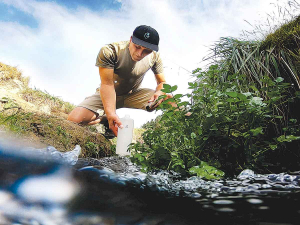Green no more?
OPINION: Your old mate has long dismissed the Greens as wooden bicycle enthusiasts with their heads in the clouds, but it looks like the ‘new Greens’ may actually be hard-nosed pragmatists when it comes to following voters.
 Programme co-lead Uwe Morgenstern takes a water sample from a spring-fed stream. Photo Credit: GNS Science
Programme co-lead Uwe Morgenstern takes a water sample from a spring-fed stream. Photo Credit: GNS Science
With much of the North Island experiencing drought this summer and climate change projected to bring drier and hotter conditions, securing New Zealand’s freshwater resilience is vital, according to state-owned GNS Science.
The crown research institute says it is rising to the challenge, building understanding of NZ’s groundwater systems and striving to provide advanced warning of when and where the impacts of drought will hit in the future.
It is leading a multiyear research programme to fill in the gaps in knowledge of the inner workings of aquifers – their structure and storage, and the rate that water flows through the system and is recharged by rain. The scientists aim to identify the groundwater systems most vulnerable to climate change.
GNS says that while the most direct cause of drought is lack of rainfall coupled with warm weather, aquifers play an important role in mitigating the impacts of prolonged drought. During dry spells, some rivers and streams cope well when the rain doesn’t come, maintaining water flows, while others suffer low flows. The varying performance can be due to the drought resilience of the groundwater system that replenishes them. It notes that existing drought assessment tools have a high level of inaccuracy because they focus on soil and surface water and don’t consider the deep reservoir of connected groundwater that sustains freshwater systems. The future-proofing groundwater systems research programme, which has received $10m funding from the Ministry of Business, Innovation and Employment (MBIE) Endeavour Fund, will characterise aquifers’ resilience to drought, identifying those that can buffer drought impacts, and those which are more vulnerable.
The models developed by the programme will enable both multidecade forecasts and seasonal projections of where the impacts of drought will occur. The programme will conduct research in five case studies, in regions where drought and nitrate contamination are of greatest concern (Hawke’s Bay, Northland, Waikato, Wairarapa and Canterbury).
“These forecasts will help us be better prepared when drought hits, reducing the impacts and costs for our primary producers, regional councils and iwi,” says Catherine Moore, GNS principal scientist and co-lead of the research programme.
“With long-term forecasts we can make better decisions about infrastructure projects and land use, mitigating the consequences of reduced water availability.”
More than 80% of the water flowing at NZ’s surface is supplied by groundwater, and at times of drought this contribution can be critical.
Budou are being picked now in Bridge Pā, the most intense and exciting time of the year for the Greencollar team – and the harvest of the finest eating grapes is weeks earlier than expected.
The Real Estate Institute of New Zealand (REINZ) has released its latest rural property report, providing a detailed view of New Zealand’s rural real estate market for the 12 months ending December 2025.
Rural retailer Farmlands has released it's latest round of half-year results, labeling it as evidence that its five-year strategy is delivering on financial performance and better value for members.
OPINION: "We are back to where we were a year ago," according to a leading banking analyst in the UK, referring to US president Donald Trump's latest imposition of a global 10% tariff on all exports into the US.
DairyNZ says the Government’s proposed Resource Management Act reform needs further work to ensure it delivers on its intent.
Overseas Trade Minister Todd McClay says he's working constructively with the Labour Party in the hope they will endorse the free trade agreement (FTA) with India when the agreement comes before Parliament for ratification.

OPINION: A mate of yours truly reckons rural Manawatu families are the latest to suffer under what he calls the…
OPINION: If old Winston Peters thinks building trade relations with new nations, such as India, isn't a necessary investment in…